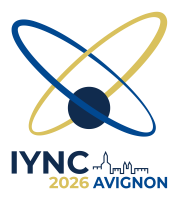-
Track 1: Nuclear Power Plants Design, Digitalization, Operation, and Maintenance
TT1This track covers design, digitalization, operation and maintenance of conventional reactors, nuclear energy systems and offshore systems. It includes design and construction; certification process; early site permits; digitization applications in nuclear energy systems as information and communication technology; artificial intelligence; digital twins; cloud computing; machine learning; data analytics, blockchain or Internet-of-Things (IoT) to nuclear energy systems. It also includes cost optimization; life cycle management; risk-based or risk-informed operation and maintenance; operational experiences; performance and reliability improvements; outage optimization; power uprating; asset management; human factors; construction and project management techniques; plant staffing; outage reduction features; major component reliability; repair and replacement; in-service inspection; codes and standards.
-
Track 2: Light Water Reactors Design, Advanced Reactors Design and Fusion Technologies
TT2This track focuses on the design of current, near-term, and long-term reactors. It includes, but is not limited, light-water reactors (LWRs), small modular reactors (SMRs); microreactors as well as advanced reactors design; accelerator-driven subcritical systems; research and demonstration reactors; advanced construction, certification processes for innovative systems and project management techniques. The track also involves fusion energy physics; burning plasma experiments; target fabrication and technology; tritium science and technology; magnetic and inertial fusion energy reactor studies; heating and current drive physics and technology; plasma control; plasma diagnostics; fusion-driven subcritical systems. This track also includes certification processes applied to designs of innovative reactors.
-
Track 3: Nuclear Physics, Neutronics and Reactor Physics
TT3This track covers physics related to nuclear applications. It includes nuclear data libraries; transport theory numerical methods; deterministic and Monte Carlo methods, models, computational codes and their verification and validation; uncertainty quantification in reactor physics; High-Performance Computing (HPC) optimization techniques. It also includes core design methods; core optimization; multi-physics coupling; nuclear criticality safety analysis and associated experiments; core mixtures (MOX, Th, UO2, HALEU).
-
Track 4: Thermal Hydraulics
TT4This track covers thermal-hydraulic experiments, modelling and simulation. It includes separate and integral effect tests; thermal hydraulic experimental techniques and measurement; heat transfer under single, two-phase and multiphase flow; development, validation, and application of thermal-hydraulic computer codes at the system, component, meso and micro-scales; containment thermal-hydraulics and aerosol transport; thermal-hydraulics of the molten core; neutronic/thermal-hydraulics coupling calculation; thermal hydraulics/structural coupling calculation.
-
Track 5: Nuclear and Structural Materials
TT5This track covers studies related to materials and structure in nuclear power systems. It includes fuel, core, reactor pressure vessel and internals structures; environmental effects and fracture mechanics; design and monitoring for seismic; advanced materials issues; irradiation issues, materials and structural mechanics issues; aging material issues; concrete and steel containments design and analysis; structural codes and standards for new generation plants; methods and process to qualify new materials dedicated to nuclear applications.
-
Track 6: Nuclear Safety, Security, Safeguards and Radiation Protection
TT6This track covers 3Ss in nuclear applications safety, security and safeguards, and radiation protection. It includes design basis accidents; BEPU analysis; severe accidents; natural disaster-initiated accidents; Probabilistic Safety Assessment (PSA); Probabilistic Risk Assessment (PRA); accident management; risk management; reliability engineering; emergency preparedness and response; fire protection; radiological safety; radiation monitoring; advanced dosimetry; nuclear plant security; nuclear material safeguards; non-proliferation of nuclear weapons; ALARA and ALARP; reactor licensing; regulatory issue; as well as radiation measurement, detection, and shielding; neutron spectroscopy; neutron and photon correlation and multiplicity.
-
Track 7: Nuclear Fuel, Fuel Cycle, Waste Management and Decommissioning
TT7This track covers issues related to nuclear fuel itself and nuclear fuel cycle. It includes fuel reliability issues and experience; advanced fuel cycles and associated fuel forms; fuel cycle simulation tools; fuel cycle economics ; burn-up credit and optimization; reload analysis and optimization techniques; spent fuel disposition; future for nuclear fuel resources; uranium mining, enrichment and processing; fuel fabrication and manufacturing; MOX fuel; fuel blending from HEU; HALEU; thorium and associated fuel cycle; alternative fuels such as molten salts; TRISO particles or Pebble Beds fuels; reprocessing; onsite storage; geological repositories; transportation of spent fuel; fuel cask design; waste transmutation; waste minimization, transport, processing and disposal; decontamination and decommissioning of nuclear facilities. Advanced technologies to complete the life cycle of nuclear facilities like AI, Digital Twins or Virtual Reality.
-
Track 8: Policy, Economic and Social Aspects of Nuclear Technology Deployment
TT8This track covers non-technical aspects of nuclear applications. It includes government programs supporting deployment; economics of nuclear power and nuclear non-power systems, such as hydrogen production, nuclear desalination and industrial-district heating; international cooperation; public acceptance; environmental impacts of nuclear systems; contribution of nuclear power to carbon emission reduction; climate change mitigation; and sustainable practices.
-
Track 9: Communication, Knowledge Management and YGN Best Practices
TT9This track covers communication campaigns, strategies and approaches for promotion of nuclear energy, knowledge management, and best practice sharing of YGNs. It includes training and education; teaching approaches; design of nuclear professional degree; curriculum development; roles of laboratories and experimental facilities; collaborative efforts of industry and research in education; evaluation of training and education; nuclear power plant personnel training; National Young Generation projects; Regional Young Generation projects; new initiatives; experience sharing; IYNC and YGN forecasting.
-
Track 10: Nuclear Design for Non-Power Applications
TT10This track covers all non-power nuclear designs. It includes applications of nuclear technology in various fields, including but not limited to agriculture, mining, medicine, biology, industry, radiation measurement, and oil logging. It also includes non-classical nuclear system concepts and non-conventional energy conversion systems (ie. excluding technologies mentioned in Track 2); non-destructive examination technologies; radioisotope thermoelectric generator; nuclear power for space exploration including thermal and electric propulsion, nuclear batteries and further space technology development.
Choose timezone
Your profile timezone:

